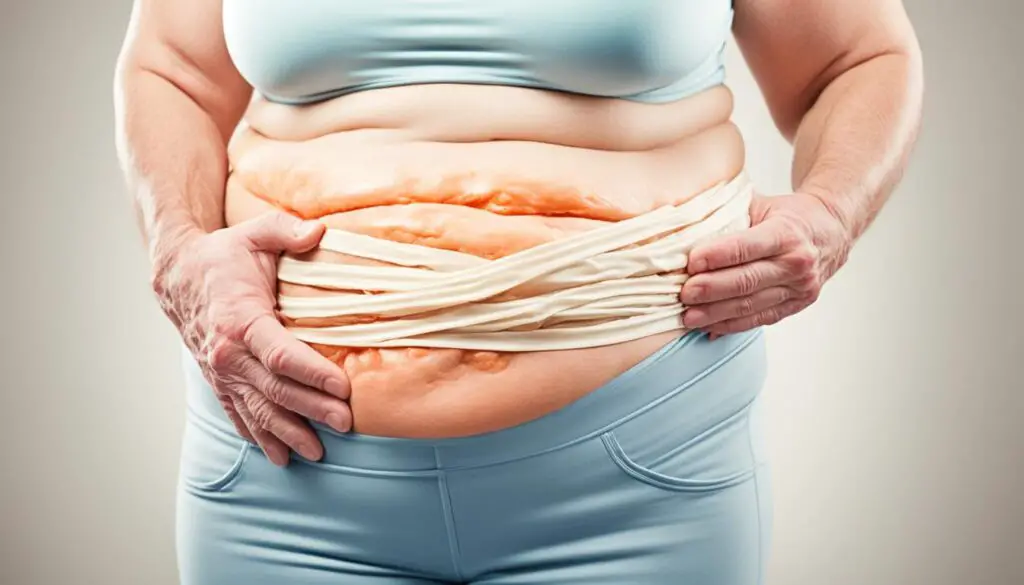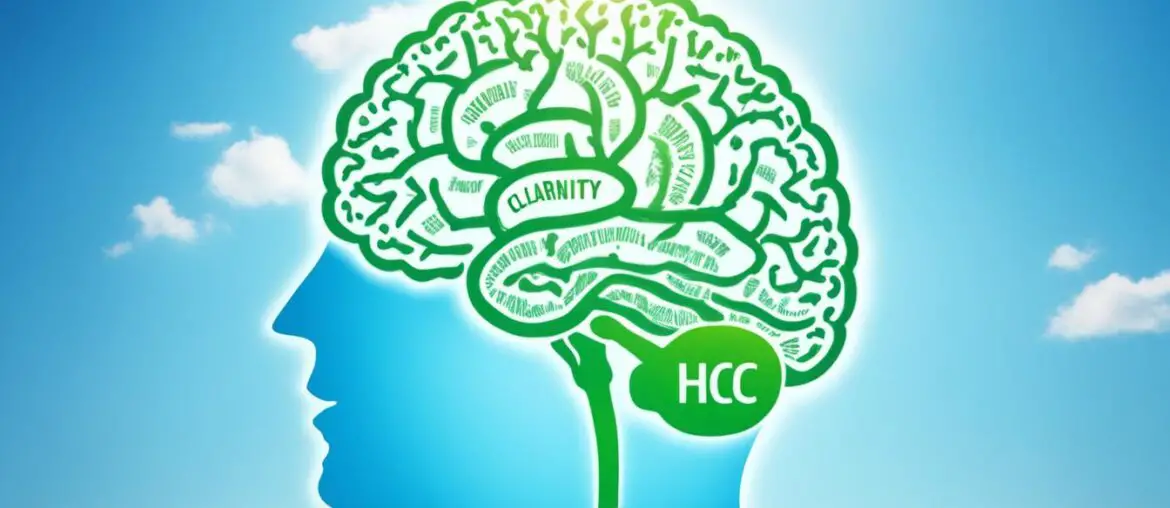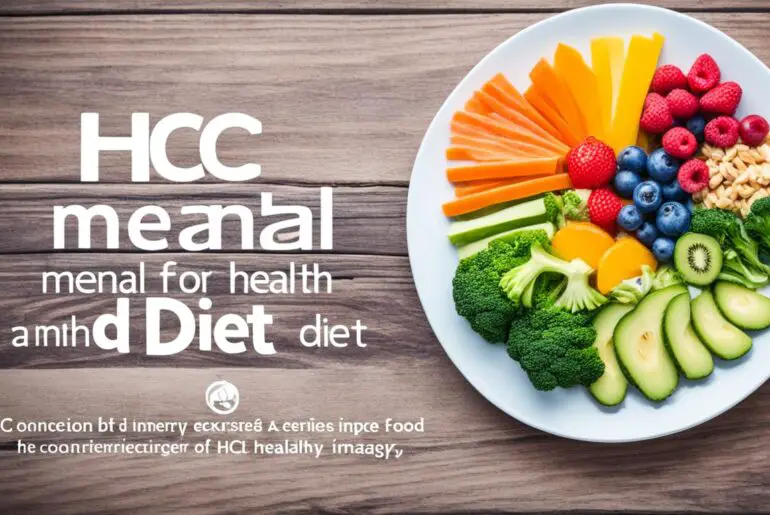Did you know that the HCG Diet, a popular weight loss method, claims to have effects on mental clarity and cognitive function? This surprising fact has caught the attention of many individuals looking to improve their brain health while shedding those extra pounds. However, it is essential to examine the scientific evidence behind these claims and understand the potential risks associated with the HCG Diet.
The HCG Diet involves severe calorie restriction, typically around 500 calories per day, combined with injections of the hormone HCG (human chorionic gonadotropin). While proponents of the diet argue that it can enhance mental focus and cognitive performance, the reality is not that straightforward.
Key Takeaways:
- The HCG Diet claims to have effects on mental clarity and cognitive function.
- Scientific evidence does not support the belief that the HCG Diet improves mental clarity or cognitive performance.
- Severe calorie restriction can have negative effects on cognitive function and overall brain health.
- The HCG Diet is not considered safe by the FDA and can lead to various risks and side effects.
- Exploring safer and more sustainable weight loss methods, such as a balanced diet and regular exercise, is recommended.
What is the HCG Diet?
The HCG Diet is an extremely low-calorie diet combined with injections of the hormone HCG. HCG, or human chorionic gonadotropin, is a hormone produced during pregnancy. The diet follows a specific protocol that includes different phases to achieve weight loss and maintenance.
HCG Diet Overview
The HCG Diet protocol involves distinct phases that participants follow. It typically starts with a loading phase where high-fat, high-calorie foods are consumed to build up fat stores. This phase is followed by a weight loss phase, during which severe calorie restriction is implemented, with daily caloric intake limited to approximately 500 calories. The HCG injections are continued during this phase to support the body’s metabolism and help maintain muscle mass.
| Phase | Description |
|---|---|
| 1. Loading Phase | Consumption of high-fat, high-calorie foods to build up fat stores. |
| 2. Weight Loss Phase | Severe calorie restriction (around 500 calories per day) while continuing HCG injections. |
| 3. Maintenance Phase | Gradual increase in calorie intake but avoiding sugars and starches. |
The duration of the weight loss phase typically lasts for 3 to 6 weeks, depending on individual goals and adherence to the diet. After completing the weight loss phase, individuals enter the maintenance phase, where calorie intake gradually increases but certain food groups, particularly sugar and starches, are avoided to maintain weight loss.
The HCG Diet protocol is specific and regimented, aiming to create a significant calorie deficit for weight loss while utilizing the HCG hormone to support the body’s metabolic processes.
Is the HCG Diet Safe?
The safety of the HCG Diet has been a subject of concern, with the FDA issuing warnings about its potential risks and side effects. Over-the-counter HCG products are considered illegal, and companies that sell them are breaking the law. It is crucial to understand the potential dangers associated with this diet and explore safer alternatives for weight loss.
One of the main risks of the HCG Diet is severe calorie restriction. By consuming only around 500 calories per day, individuals may be putting their health at risk. This extreme restriction can lead to various complications, including the formation of gallstones, irregular heartbeat, and electrolyte imbalances.
In addition to these risks, the HCG Diet can also cause vitamin and mineral deficiencies, which can negatively impact overall health. It may result in fluid buildup and swelling of the breasts, particularly in boys and men. Furthermore, there is a potential risk of blood clots forming and blocking blood vessels, which can have serious consequences.
Discussing the potential risks of the HCG Diet with a healthcare provider is crucial to make an informed decision. They can provide guidance based on your individual health profile and explore safer alternatives. It is important to prioritize health and well-being when embarking on a weight loss journey to ensure long-term success.
Expert Quote:
“The FDA has issued warnings about the safety of the HCG Diet due to the severe calorie restriction and potential risks. It is important to consult with a healthcare provider to fully understand the potential dangers and explore safer alternatives.”
In Summary:
The HCG Diet is considered unsafe by the FDA, and over-the-counter HCG products are illegal. Severe calorie restriction can lead to various risks and complications, including gallstone formation, irregular heartbeat, vitamin and mineral deficiencies, electrolyte imbalances, fluid buildup, and swelling of the breasts. There is also a potential risk of blood clots forming and blocking blood vessels. It is crucial to consult with a healthcare provider to assess the potential risks and explore safer alternatives for weight loss.
| Risks of the HCG Diet | Consequences |
|---|---|
| Gallstone formation | Potential blockage of the bile ducts, leading to pain and other complications |
| Irregular heartbeat | Disruption of normal heart rhythm, potentially leading to cardiovascular issues |
| Vitamin and mineral deficiencies | Potential negative impact on overall health and well-being |
| Electrolyte imbalances | Possible disturbances in crucial electrolyte levels, affecting bodily functions |
| Fluid buildup and swelling of the breasts | Uncomfortable physical changes, particularly in boys and men |
| Potential blood clots | Increase the risk of blood clot formation and potential blockage of blood vessels |
Does the HCG Diet Improve Mental Clarity?
When it comes to mental clarity and cognitive function, there is no scientific evidence to suggest that the HCG Diet provides any significant benefits. The focus of this diet is primarily on severe calorie restriction for weight loss, rather than enhancing brain health or cognitive performance. While individuals may experience changes in their mental state while on the HCG Diet, these effects are likely due to the overall changes in the body as a result of the low-calorie intake.
It is important to note that severe calorie restriction can have negative effects on cognitive function and overall brain health. The limited intake of essential nutrients, such as vitamins and minerals, can impact brain function and lead to decreased mental acuity and focus. Without proper nourishment, the brain may not function optimally, making it difficult to achieve mental clarity and cognitive performance.
Therefore, while some individuals may report improvements in mental clarity while on the HCG Diet, it is essential to recognize that these effects are most likely attributed to the calorie restriction rather than any specific cognitive benefits of the diet. To enhance cognition and support brain health, it is advisable to focus on a balanced diet that provides adequate nutrition, including essential nutrients for optimal cognitive function.
“Severe calorie restriction on the HCG Diet may not provide the necessary nutrients for optimal brain function, potentially leading to decreased mental clarity and cognitive performance.”
While the HCG Diet may be appealing for its potential weight loss benefits, it is crucial to prioritize overall health and well-being, recognizing that mental clarity relies on a well-nourished brain. Safely enhancing cognitive function and mental acuity can be achieved through a balanced diet that supports brain health, regular exercise, sufficient sleep, stress management, and other lifestyle factors.
As always, it is advisable to consult with a healthcare professional or registered dietitian before making any significant dietary changes, especially when considering extreme diets like the HCG Diet. These professionals can provide personalized guidance and help determine the most suitable approach to overall health and sustainable weight loss.
Side Effects of the HCG Diet

The HCG Diet, although popular for its potential weight loss benefits, is not without its side effects. It is important to be aware of these potential risks before embarking on this diet.
HCG Diet and Fatigue
One common side effect reported by individuals on the HCG Diet is fatigue. The severe calorie restriction associated with this diet can lead to a lack of energy, making it difficult to carry out daily activities.
HCG Diet and Irritability
Another side effect that some people experience on the HCG Diet is irritability. The restriction of calories and potential hormonal changes can contribute to mood swings and increased irritability.
HCG Diet and Depression
Depression is another potential side effect of the HCG Diet. The drastic reduction in calorie intake and potential nutrient deficiencies can have an impact on mental wellbeing, leading to feelings of sadness and hopelessness.
Fluid Buildup on HCG Diet
Fluid buildup, also known as edema, is a potential side effect of the HCG Diet. This can cause swelling in the hands, feet, or other parts of the body. It is important to monitor any significant changes in fluid retention and seek medical advice if necessary.
Swelling of Breasts on HCG Diet
In some cases, boys and men may experience swelling of the breasts while on the HCG Diet. This side effect is attributed to hormonal changes and should be discussed with a healthcare provider if it occurs.
It is important to remember that these side effects may vary from person to person, and not everyone will experience them. However, it is essential to monitor any changes in mood or physical symptoms while on the HCG Diet and consult a healthcare provider if necessary.
| Side Effect | Description |
|---|---|
| Fatigue | Low energy levels due to severe calorie restriction |
| Irritability | Mood swings and increased irritability |
| Depression | Feelings of sadness and hopelessness |
| Fluid Buildup | Swelling in the hands, feet, or other parts of the body |
| Swelling of Breasts | Enlargement of the breasts in boys and men |
Alternatives to the HCG Diet for Weight Loss
When it comes to weight loss, there are safer and more sustainable methods than the HCG Diet. Instead of subjecting yourself to the potential risks and drawbacks of this extreme diet, consider the following alternatives:
A Balanced Diet
A balanced diet is a key component of healthy weight loss. By consuming a variety of foods from different food groups in appropriate portions, you can provide your body with the nutrients it needs while creating a slight calorie deficit for weight loss. This approach ensures that you receive essential vitamins, minerals, and macronutrients, supporting overall health and well-being.
Regular Exercise
Regular exercise is essential for weight loss and maintaining a healthy lifestyle. Engaging in physical activity helps to increase calorie expenditure, improve cardiovascular health, build muscle mass, and boost metabolism. Incorporating a mix of cardiovascular exercises, strength training, and flexibility exercises into your routine will help you achieve sustainable weight loss goals.
Consultation with a Healthcare Provider or Registered Dietitian
When considering weight loss methods, it is important to seek professional guidance. Consulting with a healthcare provider, such as a doctor or registered dietitian, can provide personalized advice and ensure that your weight loss approach is safe and appropriate for your individual needs and health conditions. They can help you develop a customized plan that aligns with your goals and address any underlying health concerns that may impact your weight loss journey.
“Choosing a balanced diet and regular exercise as alternatives to extreme diets like the HCG Diet ensures a safer and healthier approach to weight loss.”
By focusing on a balanced diet, regular exercise, and professional guidance, you can achieve healthy and sustainable weight loss. Prioritizing these alternatives to the HCG Diet will not only help you shed pounds but also improve your overall well-being.
Comparing Weight Loss Methods
| Weight Loss Methods | Safer Weight Loss Methods | HCG Diet |
|---|---|---|
| Approach | Emphasizes balanced diet and regular exercise | Severe calorie restriction and HCG injections |
| Sustainability | Long-term lifestyle changes | Unsustainable and often leads to weight regain |
| Health Impact | Improves overall health and well-being | May lead to nutrient deficiencies and negative side effects |
| Professional Guidance | Consultation with healthcare provider or dietitian | No professional oversight |
In conclusion, opting for safer weight loss methods such as a balanced diet, regular exercise, and professional guidance is a responsible and effective approach. These alternatives to the HCG Diet prioritize overall health, sustainability, and long-term success while minimizing potential risks and negative side effects.
Long-Term Effects of the HCG Diet

The HCG Diet, with its severe calorie restriction, is not recommended for long-term weight loss and maintenance. While it may result in initial weight loss, the unsustainability of this diet often leads to weight regain in the long run. The extreme restriction of calories can trigger hormonal changes that increase hunger, making it difficult to maintain the achieved weight loss.
When following the HCG Diet, the body undergoes significant metabolic adaptations due to the low-calorie intake. These adaptations can persist even after completing the diet, making it more likely for any lost weight to be regained once normal eating patterns are resumed.
Sustainable weight loss should be approached through gradual and realistic changes to eating habits and lifestyle. It is essential to adopt a balanced diet that provides adequate nutrition and supports overall well-being. Incorporating regular exercise into one’s routine not only aids in weight loss but also promotes cardiovascular health and strengthens the body.
It is important to prioritize safe and sustainable methods for weight loss, rather than relying on extreme diets like the HCG Diet. Consulting with a healthcare provider or registered dietitian can provide valuable guidance and ensure that weight loss efforts align with individual needs and health conditions.
Risks of the HCG Diet for Certain Populations
The HCG Diet can be risky for certain populations due to various factors. It is important to be aware of these risks and consider alternative weight loss methods if you fall into any of the following categories:
- Medication Interactions: If you are currently taking medication, especially for diabetes, it is vital to exercise caution when considering the HCG Diet. The severe calorie restriction can affect insulin levels and potentially interfere with the effectiveness of your medication.
- Pregnancy: Pregnant and breastfeeding women should avoid the HCG Diet altogether. The HCG hormone and the very low-calorie intake can have adverse effects on fetal development and the overall health of both the mother and the baby.
- Children: The HCG Diet is not suitable for children due to their unique nutritional needs and growth requirements. Severe calorie restriction can lead to mineral imbalances and deficiencies, which can have long-lasting effects on their health and development.
- Elderly Individuals: Elderly individuals may be more vulnerable to the potential risks of the HCG Diet due to age-related health conditions and higher chances of nutrient deficiencies. It is essential to prioritize a balanced diet that caters to their specific needs and consult with a healthcare professional for guidance.
- Cancer Risk: There is some evidence suggesting that the HCG Diet may increase the risk of certain cancers. Therefore, individuals with a personal or family history of cancer should avoid this diet to minimize any potential health risks.
Considering the potential dangers associated with the HCG Diet for these specific populations, it is crucial to prioritize safe and suitable weight loss strategies. Always consult with a healthcare professional or a registered dietitian to find the most appropriate and effective approach for your individual needs and health condition.
Scientific Evidence on the Effectiveness of the HCG Diet
Despite claims made about the HCG Diet, there is a lack of scientific evidence supporting its effectiveness for weight loss. Multiple studies have shown that the HCG Diet does not produce better results than severe calorie restriction alone. The weight loss achieved on this diet is primarily due to the drastic reduction in calories, rather than any unique effects of the HCG hormone.
The ineffectiveness of the HCG Diet is further highlighted by the fact that the HCG hormone has not been proven to significantly reduce hunger or boost metabolism. Claims of its ability to do so are not supported by scientific research.
Furthermore, the HCG Diet is widely regarded as a dangerous scam. The diet’s severe calorie restriction can lead to nutrient deficiencies, side effects, and potential health risks. The FDA has issued warnings about the use of HCG for weight loss, stating that it is not approved for over-the-counter use and that companies selling HCG products are breaking the law.
In conclusion, the scientific evidence clearly indicates that the HCG Diet is ineffective for weight loss and should be avoided. Safer and more sustainable methods, such as a balanced diet and regular exercise, should be pursued instead.
Healthy and Sustainable Weight Loss Strategies
When it comes to achieving weight loss goals, it’s essential to prioritize healthy and sustainable strategies. Crash diets and extreme measures often lead to short-term results, followed by weight regain and potential health risks. Instead, focus on making long-lasting lifestyle changes that promote overall well-being. Here are some key strategies for healthy weight loss:
1. Balanced Diet
A balanced diet plays a crucial role in achieving sustainable weight loss. Instead of severely restricting calories, aim for a well-rounded eating plan that includes a variety of nutrient-dense foods. Incorporate plenty of whole grains, lean proteins, fruits, vegetables, and healthy fats into your meals. By providing your body with essential nutrients, you’ll feel satisfied and energized throughout the day.
2. Regular Exercise
Regular physical activity is another vital component of a successful weight loss journey. Engage in activities that you enjoy, such as brisk walking, jogging, cycling, or swimming. Aim for at least 150 minutes of moderate-intensity aerobic exercise per week, along with strength training exercises to build lean muscle mass. Exercise not only burns calories but also improves cardiovascular health and boosts mood.
3. Behavior Changes
Behavior changes are instrumental in achieving long-term weight loss. Practice mindful eating by paying attention to hunger and fullness cues and eating slowly. Keep a food diary to track your eating habits and identify areas for improvement. Portion control is essential, as it helps regulate calorie intake without feeling deprived. Avoid emotional eating and develop coping mechanisms for stress and boredom that don’t involve food.
4. Support System
Having a support system can greatly enhance your weight loss journey. Surround yourself with friends, family, or participate in a weight loss support group. These individuals can provide encouragement, accountability, and helpful tips along the way. Consider working with a registered dietitian or a personal trainer who can provide professional guidance tailored to your specific needs.
By adopting a balanced diet, engaging in regular exercise, making behavior changes, and seeking support, you’ll create a sustainable approach to weight loss that improves your overall health and well-being. Remember, prioritizing long-term success over quick fixes is the key to achieving and maintaining a healthy weight.
Consultation with Healthcare Provider for Weight Loss

When considering weight loss methods, it is crucial to consult with a healthcare provider, such as a doctor or registered dietitian. Seeking professional guidance is essential to ensure that the weight loss plan you choose is safe and suitable for your individual needs and health conditions. Consulting with a healthcare professional not only helps you make informed decisions but also allows for personalized guidance throughout your weight loss journey.
Working with a healthcare provider provides several advantages. They can assess your current health status, including any underlying health concerns that may affect weight loss or require modifications to the approach. This comprehensive evaluation ensures that you embark on a weight loss plan with a solid foundation of knowledge and awareness.
A registered dietitian, in particular, can provide expert advice on nutrition and help design a balanced diet that supports your weight loss goals. They have extensive knowledge of food and its impact on the body, allowing them to tailor a diet plan to your specific needs. By working closely with a registered dietitian, you can develop a meal plan that provides all the necessary nutrients while creating the calorie deficit needed for weight loss.
Importance of Professional Guidance
The importance of consulting with a healthcare provider for weight loss cannot be overstated. They can help you navigate through various weight loss methods, separating fact from fiction and debunking common weight loss myths. With the plethora of information available online and the abundance of weight loss programs on the market, having a trusted healthcare professional by your side ensures that you receive accurate, evidence-based advice.
Moreover, a healthcare provider can monitor your progress and make adjustments as necessary. They can track your weight loss, assess any underlying health changes, and modify your weight loss plan accordingly. These regular check-ins provide accountability and support, enhancing your chances of success on your weight loss journey.
In addition, healthcare providers possess the expertise to identify potential red flags or contraindications that may impact your weight loss efforts. For example, they can evaluate the interactions between certain weight loss medications and existing medical conditions to ensure your safety and optimize your results. By considering your medical history, they can help you tailor a weight loss plan that is both effective and sustainable based on your unique circumstances.
Registered Dietitian for Weight Loss Advice
One of the key healthcare professionals that can offer invaluable guidance for weight loss is a registered dietitian. Registered dietitians are experts in food and nutrition, equipped with the knowledge and skills to provide evidence-based recommendations for weight loss.
A registered dietitian can help you identify and address dietary habits that may hinder your weight loss progress. They can assist in developing strategies to overcome challenges and make sustainable behavior changes. With their support, you can learn how to make healthier food choices, manage portion sizes, and adopt long-term lifestyle habits that promote weight loss and overall well-being.
Furthermore, a registered dietitian can provide ongoing support and motivation throughout your weight loss journey. They can help you establish realistic goals, celebrate your progress, and provide guidance during times of difficulty. Their expertise and encouragement can make a significant difference in your weight loss success.
Remember, consultation with a healthcare provider, especially a registered dietitian, is crucial for safe and effective weight loss. They can guide you through the process, help you avoid potential pitfalls, and ensure that your weight loss journey is both successful and sustainable. Prioritize your health and well-being by seeking professional guidance and embark on your weight loss journey with confidence.
Conclusion
Based on the evidence presented, it is clear that the HCG Diet is not recommended for safe and sustainable weight loss. The diet’s lack of efficacy, potential risks, and unsustainable nature make it an unreliable option for those seeking long-term weight management.
Severe calorie restriction diets like the HCG Diet can lead to negative side effects, such as nutrient deficiencies and weight regain once normal eating patterns are resumed. These diets do not provide the necessary nutrients for overall health and well-being, and they can have detrimental effects on the body.
To achieve healthy weight loss, it is crucial to prioritize safe and sustainable methods. This includes following a balanced diet that provides adequate nutrition and creating a slight calorie deficit, as well as engaging in regular physical activity. Consulting with a healthcare provider or registered dietitian can offer valuable guidance in developing a personalized weight loss plan that considers individual needs and health conditions.
When it comes to weight loss, quick fixes and extreme diets should be avoided. Instead, focus on long-term behavior changes, such as mindful eating and portion control, that can lead to lasting results. Remember to prioritize your overall health and well-being above all else.
FAQ
What is the HCG Diet?
The HCG Diet is an extremely low-calorie diet combined with injections of the hormone HCG. HCG, or human chorionic gonadotropin, is a hormone produced during pregnancy. The diet typically involves a loading phase where high-fat, high-calorie foods are consumed, followed by a weight loss phase of severe calorie restriction (around 500 calories per day) while continuing the HCG injections. The diet may be followed for 3 to 6 weeks, and then a maintenance phase is entered where calorie intake gradually increases but sugar and starch are avoided.
Is the HCG Diet Safe?
The HCG Diet is considered unsafe by the FDA. Over-the-counter HCG products are illegal and companies that sell them are breaking the law. Severe calorie restriction can lead to risks such as gallstone formation, irregular heartbeat, vitamin and mineral deficiencies, electrolyte imbalances, fluid buildup, and swelling of the breasts. There is also a potential risk of blood clots forming and blocking blood vessels. It is important to discuss with a healthcare provider the potential risks and explore safer alternatives for weight loss.
Does the HCG Diet Improve Mental Clarity?
There is no scientific evidence to suggest that the HCG Diet improves mental clarity or cognitive function. The diet primarily focuses on severe calorie restriction for weight loss, and any potential effects on mental clarity are likely a result of the overall changes in the body due to the low-calorie intake. It is important to note that severe calorie restriction can have negative effects on cognitive function and overall brain health due to limited intake of essential nutrients.
What are the Side Effects of the HCG Diet?
The HCG Diet can cause side effects such as fatigue, irritability, restlessness, depression, fluid buildup (edema), and swelling of the breasts in boys and men. These side effects may be a result of the severe calorie restriction and potential nutritional deficiencies that can occur on the diet. It is important to monitor any changes in mood or physical symptoms while on the HCG Diet and consult a healthcare provider if necessary.
What are the Alternatives to the HCG Diet for Weight Loss?
There are safer alternatives to the HCG Diet for weight loss. These include following a balanced diet that provides adequate nutrition while creating a slight calorie deficit and engaging in regular exercise. A balanced diet consists of consuming a variety of foods from different food groups in appropriate portions. Regular exercise helps to increase calorie expenditure and improve overall health. It is important to consult with a healthcare provider or registered dietitian for personalized guidance on weight loss methods.
What are the Long-Term Effects of the HCG Diet?
The HCG Diet is not recommended for long-term weight loss or maintenance. Severe calorie restriction diets are typically unsustainable and often result in weight regain. The extreme restriction of calories can lead to hormonal changes that increase hunger, making it difficult to maintain weight loss. Additionally, any weight lost on the HCG Diet is highly likely to be regained once normal eating patterns are resumed. Sustainable weight loss is best achieved through gradual and realistic changes to eating habits and lifestyle.
What are the Risks of the HCG Diet for Certain Populations?
The HCG Diet may pose additional risks for certain populations. It is important to avoid the HCG Diet if taking medication, especially for diabetes, as the low-calorie intake can affect insulin levels. Pregnant and breastfeeding women should not take HCG or go on a very low-calorie diet. Children and elderly individuals may be significantly harmed by the HCG Diet due to the potential for mineral imbalances and insufficiencies. There is also some evidence that the HCG Diet may increase the risk of certain cancers, making it even more important to avoid the diet for those with personal or family history of cancer.
What is the Scientific Evidence on the Effectiveness of the HCG Diet?
Multiple studies have shown that the HCG Diet is not effective for weight loss beyond what can be achieved through severe calorie restriction alone. The weight loss achieved on the HCG Diet is primarily due to the drastic calorie reduction, not the HCG hormone. The HCG hormone has not been proven to significantly reduce hunger or boost metabolism. The HCG Diet is considered by many to be a dangerous scam, and there is no scientific evidence to support its effectiveness.
What are Healthy and Sustainable Weight Loss Strategies?
Healthy and sustainable weight loss is best achieved through a combination of a balanced diet, regular exercise, and behavior changes. A balanced diet provides adequate nutrition while creating a slight calorie deficit for weight loss. Regular exercise helps to increase calorie expenditure and improve overall health. Behavior changes, such as mindful eating and portion control, can also contribute to long-term weight loss success. It is important to focus on overall health and well-being rather than quick fixes or extreme diets.
Should I Consult with a Healthcare Provider for Weight Loss?
It is important to consult with a healthcare provider, such as a doctor or registered dietitian, when considering weight loss methods. A healthcare provider can provide personalized guidance and ensure that any weight loss plan is safe and appropriate for individual needs and health conditions. They can also help address any underlying health concerns that may affect weight loss or require modifications to the approach. Consulting with a healthcare professional is especially important when considering extreme diets like the HCG Diet.




